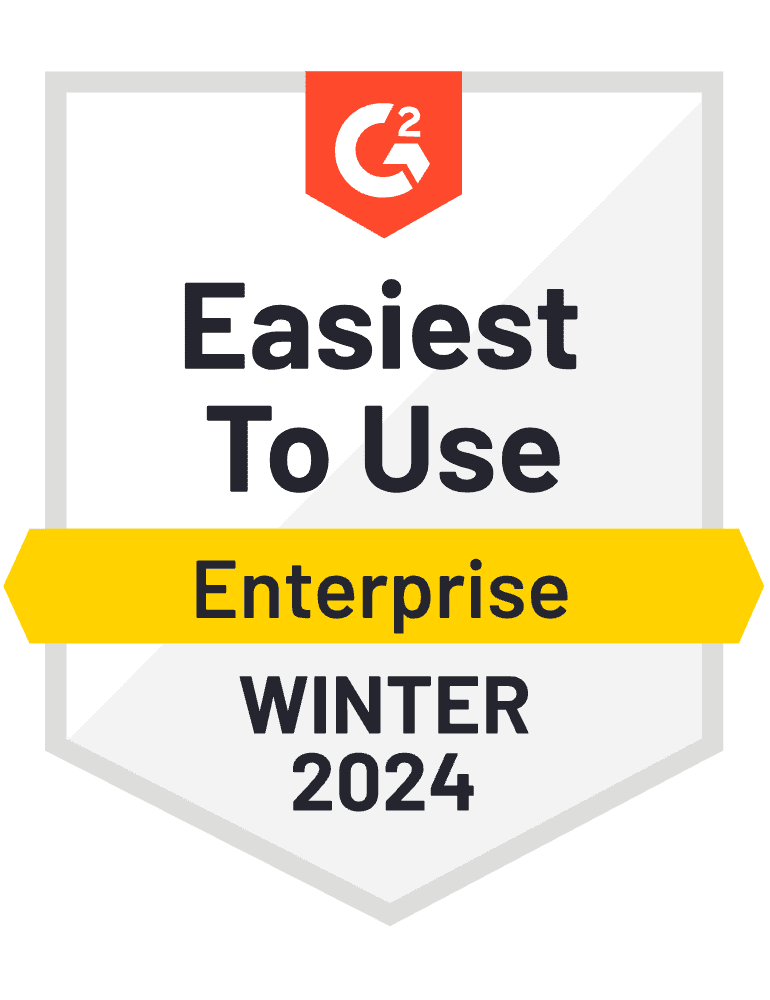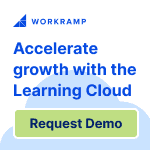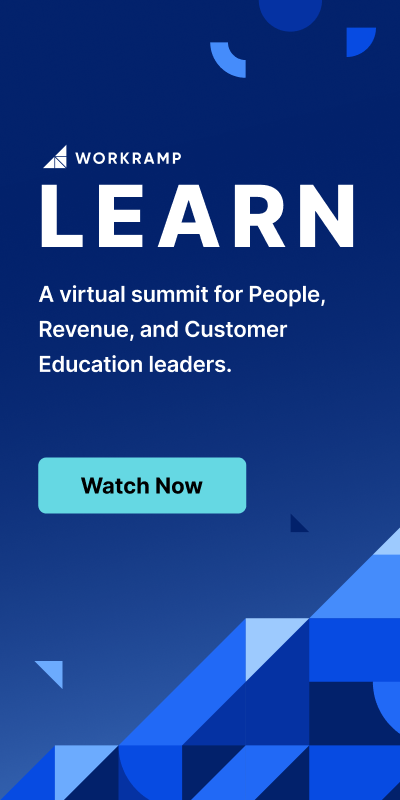8 Best Mobile LMS Platforms to Elevate eLearning Anytime, Anywhere
Emily Homrok | WorkRamp Contributor
View bioLearning Tips Straight to Your Inbox
In the age of smartphones and tablets, businesses must adapt their training programs to be compatible with mobile devices—and a mobile workforce.
According to Forbes, more than 20 percent of the workforce works remotely part-time, while more than 30 percent work remotely on a full-time basis.
A mobile learning management system (LMS) provides the ideal solution, enabling businesses of all sizes to create and deliver cost-effective educational content at scale. Whether your team members work from home or on the go while traveling, a mobile LMS ensures they have dependable, around-the-clock access to the resources and information they need.
The challenge for businesses is finding a budget-friendly LMS that delivers the features and functions they want—without the costly extras they don’t.
We’ll help you in your search by comparing nine of the best mobile-friendly learning management systems, including details about each platform’s pricing and key features.
Let’s begin by breaking down some of the use cases for—and benefits of—a mobile learning management system.
In this post:
What is a mobile LMS, and what is it used for?
An LMS is an online learning platform that enables businesses, schools, and other organizations to provide training and educational content to employees, customers, and/or students via smartphones, tablets, and other mobile devices. Like a regular LMS, a mobile LMS can act as a centralized platform for managing and delivering learning materials, tracking learner progress, and assessing the effectiveness of your training programs.
The basic purpose of a mobile LMS is to make learning accessible for employees, partners, and customers, regardless of time zones or geographic barriers. With a mobile LMS, learners can access knowledge databases, client information, HR documents, training materials, reference guides, help forums, chat spaces, and more from their smartphones or tablets.
By ensuring that training materials and other resources are available on the go, your business can reduce or eliminate the need for traditional classroom-based training, saving you time and money without sacrificing employee performance. Plus, since mobile learning allows employees to progress at their own pace and convenience, it’s a great way to boost learner engagement, knowledge retention, and employee satisfaction.
There are numerous ways that businesses can use mobile learning management systems to reach their goals faster.
Here are some examples of use cases for a mobile LMS:
- Onboarding and orientation. A mobile LMS can streamline the onboarding process for new employees. It lets new team members access training materials, company policies, and procedures on their mobile devices, ensuring a smooth transition into their new roles. This reduces the time and resources required for in-person training and provides consistent experiences for all new hires.
- Compliance training. Many industries, such as healthcare and finance, require employees to undergo regular compliance training. A mobile LMS enables your business to deliver compliance training modules on smartphones or other mobile devices, ensuring employees stay current with regulatory requirements. The ability to track completion and generate compliance reports also simplifies the auditing process, ensures adherence to industry standards, and helps protect you from liability.
- Professional development. A mobile LMS can support employees’ professional growth and development. Organizations can provide access to industry-specific training courses, webinars, and other resources, allowing employees to expand their skills and knowledge. This benefits the individual employees, enhances the organization’s talent pool, and promotes a culture of continuous learning.
Read more: 6 Effective Ways to Support Employee Career Growth
Mobile LMS features to look for
Here are five key admin features to look for when choosing a mobile LMS for your business:
- Features that make it easy to manage content in multiple formats
- Learning assessment features to test employees’ knowledge and skills
- Robust tracking and reporting capabilities
- The ability to customize training for different job roles, departments, or other employee segments and groups
- Advanced privacy and security features to protect your data
1. Easy content management
Learning management systems differ from content management systems, which we explored in our LMS vs. CMS comparison.
Look for a mobile LMS with robust content management capabilities to easily create, organize, deliver, and update training materials. The platform you choose should also support various file formats, such as videos, text documents, audio files, slideshows, and multimedia presentations.
Other than the ability to support numerous file formats and types of content, here are a few more examples of specific content management features to look for when selecting a mobile LMS:
- Easy-to-use content editing, publishing, and scheduling tools
- A user-friendly, drag-and-drop interface
- Support for multiple languages
- Native integrations with tools your team commonly uses
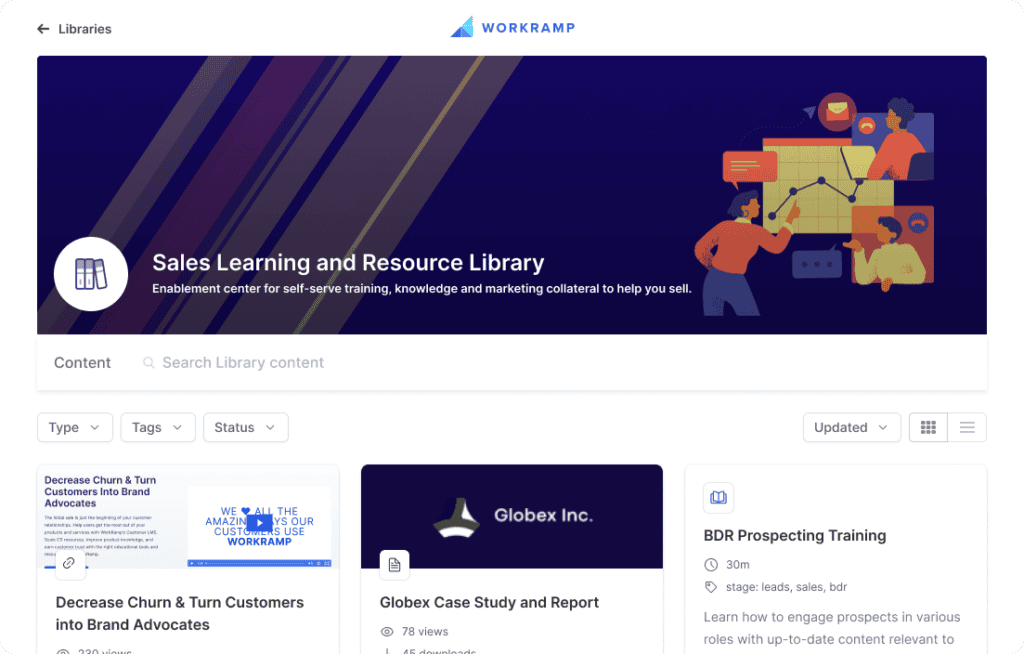
WorkRamp CMS
WorkRamp CMS is a unified LMS + CMS for revenue enablement and learning content. Learn more about WorkRamp CMS and how it can help your team boost sales.
2. Learning assessments
Choose a mobile LMS platform that includes built-in learning assessments to ensure you can test and measure the efficacy of your employee training programs, such as your sales training or soft skills training programs.
These assessments—which generally take the form of quizzes, tests, or surveys—allow you to gauge how well learners acquire, apply, and master skills and whether learners retain knowledge over time.
Assessments also enable learners to receive immediate feedback, which research links to increased engagement and performance. According to Gallup—which notes that 80 percent of employees who say they have received meaningful feedback in the past week are fully engaged—the best way to provide workplace feedback is to do so quickly and frequently, an approach Gallup refers to as Fast Feedback.
There’s another benefit: by analyzing the results of employee learning assessments, admins can accurately track employee progress and identify areas where additional training may be required. By pinpointing the areas where training (or retraining) would be most beneficial, your business can close skill gaps strategically and cost-effectively and avoid wasting time or money on training programs that aren’t productive.
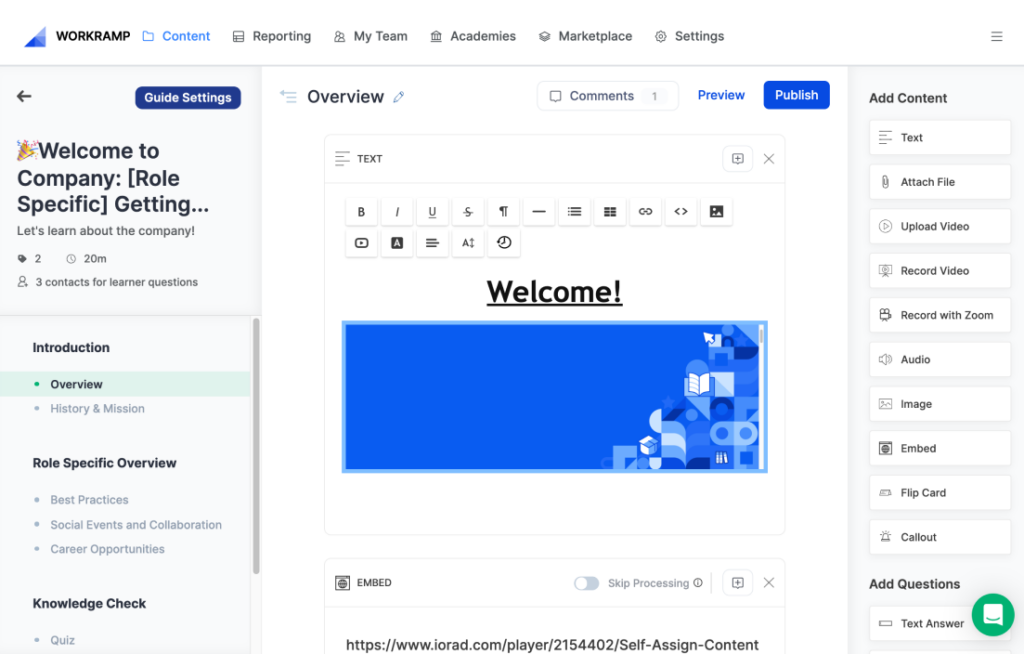
WorkRamp’s Employee LMS
With the Learning Cloud from WorkRamp, you can create quizzes and self-assessments to measure and track learner progress and skill mastery. For example, you can require learners to take a quiz after completing a specific online course or module.
3. Tracking and reporting
Reporting and analytics are crucial features for any LMS—mobile or otherwise—because they provide valuable, actionable insights into the efficacy of your training programs.
For example, reporting features allow you to track learner progress, skill acquisition, and performance in targeted areas. They also provide detailed data on course completion rates, quiz scores, and total time spent on each module or course.
You can use this information to identify learners who may be struggling and require additional support or intervention—and, on the flip side, recognize and reward the achievements of high-performing employees.
With native reporting, trend analysis tools, performance analysis tools, out-of-the-box visualizations, and more, the Learning Cloud makes it easy to measure the impact of your L&D and training programs.
Read more: 6 Proven Methods to Measure the Impact of Your Training Programs
4. Learning customization
Employees have different learning styles and preferences. Moreover, some learners may need specific accommodations for accessibility, such as learners who are visually impaired.
Regardless of these differences, learner engagement increases when educational content is personalized and relevant. In addition to boosting engagement, custom learning paths promote a culture of continuous learning within your organization. That’s because providing employees with personalized learning journeys emphasizes the importance of ongoing skill development and professional growth. This approach to L&D benefits individual employees, enhances your organization’s talent pool, and prepares employees for future challenges and opportunities.
For all of these reasons, it’s essential to choose a mobile LMS that offers the flexibility to design customized learning paths. WorkRamp’s mobile-friendly platform enables you to build custom learning paths and certifications for employees, partners, and customers.
5. Security and data privacy
Depending on factors like your industry and location, your business may be required to comply with information privacy laws like the California Consumer Privacy Act (CCPA). And no matter where you’re located, your customers, partners, and employees need to feel like their information is protected.
Data leaks and security breaches can cause your organization to lose trust, business, and revenue—and potentially, even a lawsuit. Therefore, when choosing a mobile LMS, look for a platform that protects against cyber threats while complying with data privacy regulations.
The Learning Cloud includes security features to protect your data from unauthorized access.
Here are a few examples of the LMS security features built into WorkRamp’s mobile-friendly eLearning platform:
- Advanced data encryption
- Role-based access control
- Identity verification tools
- Single sign-on (SSO)
- SOC 2 Type II compliance
Best mobile LMS platforms in 2024
Now that we’ve reviewed some key features to look for in a mobile LMS —such as easy content management, customized learning paths, and robust tracking and reporting capabilities—let’s compare some popular mobile LMS platforms for businesses.
To help you choose the right platform for your needs, we’ve rounded up 11 of the top mobile learning management systems in 2024.
Below, you’ll find overviews of each platform and information about their features and pricing.
WorkRamp
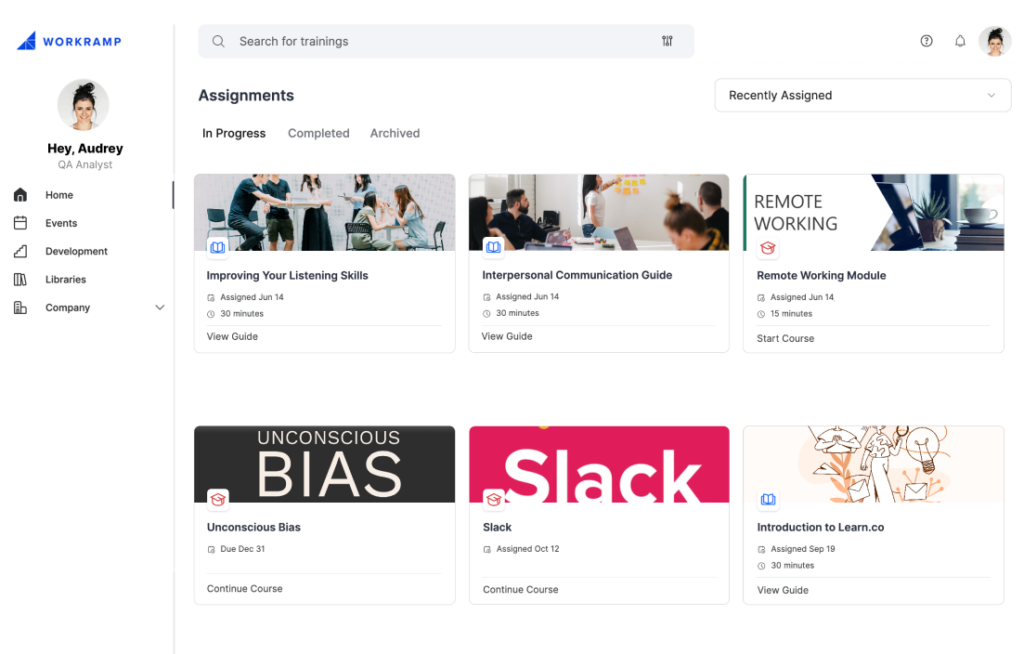
The Employee Learning Cloud from WorkRamp is a powerful, cloud-based LMS that allows small, midsize, or large organizations to create engaging mobile training programs that scale effortlessly as you grow.
Build your own custom learning paths for specific roles and departments, or use our Prebuilt LMS Content for ready-to-go training. Learners can access the platform from any location or device, while admins can easily implement and manage the system for learners. In fact, WorkRamp was voted easiest to use and easiest to set up by G2 users.
In addition to training your employees, WorkRamp helps team members collaborate and provides actionable insights and analytics to help your team report on training results.
No matter how you decide to use WorkRamp—from sales enablement to onboarding, compliance, professional development, and employee upskilling—the Learning Cloud is built to help your business propel growth.
Key Features:
- Easy-to-use course-authoring and content-creation tools
- Customizable dashboards and learning paths
- Prebuilt course library for ready-to-go content
- Streamlined, intuitive interface
- Support for multiple languages and file formats
- Robust data security and user privacy features
- Asynchronous and synchronous learning options
- Support for live events and instructor-led training
- Social learning and collaboration tools
- Learner assessments, quizzes, and tests
- Integrations with third-party apps and software like Salesforce, Workday, BambooHR, and Google Analytics
Pricing:
Check out WorkRamp’s pricing page for more details.
Moodle
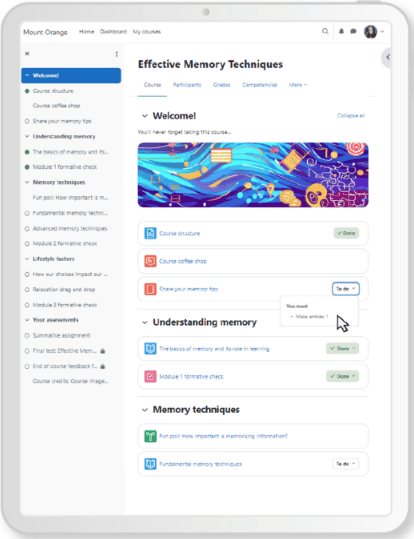
Source: Moodle
Moodle describes itself as a feature-rich learning platform designed to improve your teaching, training, and learner outcomes.
Moodle offers various eLearning solutions, some geared toward K-12 schools and educators and others focused on vocational or workplace training.
Moodle’s LMS is open-source, but certain platform features, such as custom domain names or 24-hour customer support, are only available through premium plans.
Key Features:
- Tracking and analytics to measure learner progress
- Collaboration features to support social learning
- Learner assessments and quizzes
- Notifications about deadlines and required courses
- 24-hour customer support
Pricing: Moodle offers two tiers of plans: a Standard tier, which covers five different types of plans, and a Premium tier. Premium tier pricing is available upon request.
Standard tier pricing varies by plan as follows: Starter ($120/year), Mini ($210/year), Small ($390/year), Medium ($900/year), and Standard ($1,690/year).
Anthology (formerly Blackboard)

Source: Anthology
Anthology, previously known as Blackboard, is a versatile platform that offers a suite of L&D solutions for different types of organizations, including:
- Blackboard Learn — An LMS for educators
- Anthology for Government — An LMS designed for government agencies
- Anthology for Business — An LMS that allows businesses to provide flexible, professional development, training, and online learning solutions for employees
Key Features:
- Course-building tools
- Learner registration and management tools
- Intuitive interface
- Translations available for different languages
- Integrations with HR software and other apps
Pricing: Anthology for Business pricing is available upon request, including Bronze, Silver, and Gold partner tiers and additional strategic partnership tiers. According to Anthology’s FAQ page, partners can join the Community Tier for free, or if they integrate with Blackboard Learn, join the Developer’s Network Tier for $3,000/year.
Canvas LMS

Source: Canvas LMS
Canvas LMS is a learning management system with a mobile-friendly app targeted toward teachers and educational institutions. Canvas enables students and teachers to communicate instantly, share and grade assignments, participate in discussions, and more.
Key Features:
- Content creation tools
- Learner assessments, tests, and quizzes
- Personalized learning paths
- Interactive analytics
- Integrations with various third-party apps
Pricing: According to the Canvas website, A Canvas Free-for-Teacher account has the essential features and functionality of Canvas LMS, even if your institution is not a Canvas customer. To access advanced features and support, you’ll need to upgrade to the paid version of Canvas, with pricing details available upon request.
Sakai LMS
Sakai LMS is an open-source learning management system geared toward schools and educators. The platform allows teachers to create online courses, tests, and assignments and includes features that enable students and learners to collaborate on projects, such as course calendars and text chat features.
Key Features:
- API and integrations
- Communication tools like discussion boards and messaging features
- Configurable user roles and permission levels
- Custom course creation and management
- Synchronous and asynchronous learning
Pricing: Sakai LMS offers a free version that must be hosted and configured by your business or a cloud-hosted version that’s free to try.
Docebo
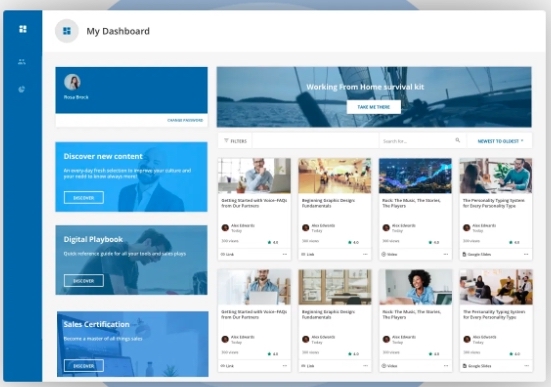
Source: Docebo
According to its website, Docebo is an employee and partner learning platform designed to engage your learners, simplify content management, and streamline your workflows and tech stack.
Docebo’s mobile learning app can be used to facilitate employee onboarding, compliance training, and sales training.
Key Features:
- Content creation tools
- Personalized learning paths
- User-friendly interface
- Social, e-commerce, and video conferencing integrations
- Configurable dashboards
- Custom reporting
Pricing:
Docebo’s pricing is available upon request. According to Docebo’s website, Docebo typically works best with companies who are training at least 300+ learners in their project.
TalentLMS
TalentLMS is a cloud-based learning platform designed for small to large businesses. TalentLMS has various use cases, including employee training and sales training, and offers industry-specific solutions for healthcare, manufacturing, consulting, and other industries.
Key Features:
- Blended learning
- Course creation and management features
- Learner tests and assessments
- Custom learning paths
- Communication tools
Pricing: Talent LMS offers five pricing plans: Starter ($69/month), Basic ($149/month), Plus ($279/month), Premium ($459/month), and Enterprise (pricing available upon request). Talent LMS also offers an option to start with a forever-free plan and scale as you grow, although the number of users and features is limited compared to the paid plans (up to five for free vs. up to 40 for Starter).
Absorb LMS
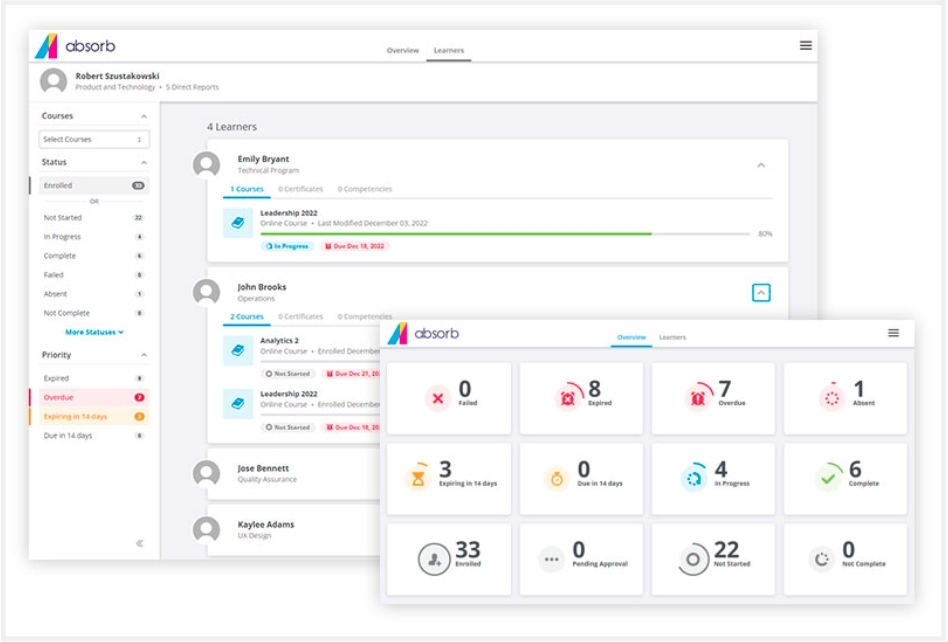
Source: Absorb LMS
Absorb LMS is a cloud-based learning management system geared toward enterprises and large organizations. The platform can be used to create and sell online courses, streamline new employee onboarding, and deliver various types of mobile training.
Key Features:
- SCORM compliance
- eCommerce portal
- Reporting and analytics dashboards
- Ready-to-use content libraries
- Integrations with various apps and software
Pricing: Absorb LMS offers a free demo. However, to continue using the platform and unlock advanced features, users will need to upgrade to a premium plan. Pricing is available upon request and varies depending on factors like the number of learners using the system (1 to 50 to more than 25,000).
A mobile learning management system offers the ideal solution for businesses looking to develop secure, custom online training programs.
By using a mobile LMS, your business can make training more accessible and give your employees the flexibility they need to learn successfully.
Boost your mobile LMS experience with WorkRamp
Empower employees to upskill and reskill on the go. Harness the power of a mobile learning management system for your business—and revolutionize your employee training programs.
Contact us to schedule your free, personalized demo.
Complete the form for a custom demo.
Recent Posts
- How to Drive Revenue Growth with Sales Enablement October 21, 2024
- 8 Best Salesforce Learning Management Systems (LMS) October 8, 2024
- 5 Steps to Create a Winning Sales Communication Strategy September 30, 2024
- WorkRamp’s Nine-Year Anniversary in Photos September 24, 2024
- WorkRamp Cover Story: Enabling Organizational Change at Sprout Social September 23, 2024
Emily Homrok
WorkRamp ContributorYou might also like
Leveraging L&D to set your team up for success
Use these L&D strategies to future-proof your organization and retain skilled team members.
Read More
What are the benefits of online learning?
When it comes to professional development and continued learning, online courses and programs offer several advantages over traditional in-person options.
Read More
Discover the features and benefits of the top LMS systems
Understand what to look for, essential features, platform capabilities, and more to find the best LMS platform for your organization.
Read More
Decrease Ramp Time and Increase Revenue
Get in touch to learn how WorkRamp can help you achieve your learning and development goals.
Request a Demo